|
|
|
Sort Order |
|
|
|
Items / Page
|
|
|
|
|
|
|
| Srl | Item |
| 1 |
ID:
116102
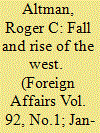

|
|
|
|
|
| Publication |
2013.
|
| Summary/Abstract |
The 2008 financial crisis and the Great Recession that followed have had devastating effects on the U.S. economy and millions of American lives. But the U.S. economy will emerge from its trauma stronger and widely restructured. Europe should eventually experience a similar strengthening, although its future is less certain and its recovery will take longer to develop. The United States is much further along because its financial crisis struck three years before Europe's, in 2008, causing headwinds that have pressured it ever since. It will take another two to three years for these to subside, but after that, U.S. economic growth should outperform expectations. In contrast, Europe is still in the midst of its financial crisis. If historical logic prevails there, it will take four to six years for strong European growth to materialize.
|
|
|
|
|
|
|
|
|
|
|
|
|
|
|
|
| 2 |
ID:
144611
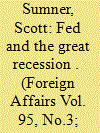

|
|
|
|
|
| Summary/Abstract |
Today, there is essentially one accepted narrative [2] of the economic crisis that began in late 2007. Overly optimistic homebuyers and reckless lenders [3] in the United States created a housing price bubble. Regulators were asleep at the switch. When the bubble inevitably popped, the government had to bail out the banks, and the United States suffered its deepest and longest slump since the 1930s. For anyone who has seen or read The Big Short, this story will be familiar.
|
|
|
|
|
|
|
|
|
|
|
|
|
|
|
|
| 3 |
ID:
110922


|
|
|
|
|
| Publication |
2012.
|
| Summary/Abstract |
A Feb. 29 update to the print story from the March/April issue: In the wake of the Great Recession it would seem natural that the 2012 election would be fought over economic issues. Yet so far in the Republican primaries, we have seen social issues, and religion especially, move to the forefront. Rick Santorum is only the latest in a series of Republicans who have infused their campaigns with talk about God. Even Mitt Romney, a Mormon who has generally tried to avoid discussing religion, has recently pledged to defend "religious liberty" against the Obama administration. Increasingly, the rhetoric of the leading Republican contenders echoes the Republican fringe of twenty years ago. Then, we heard Pat Buchanan -- the quintessential protest candidate -- bombastically declare that America was in the midst of a culture war. Today, the frontrunners all play to the Republican base by describing the White House's "war on religion."
|
|
|
|
|
|
|
|
|
|
|
|
|
|
|
|
| 4 |
ID:
097228
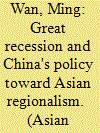

|
|
|
| 5 |
ID:
176547


|
|
|
|
|
| Summary/Abstract |
Since the Great Recession started in the late 2000s, the European Union (EU) has experienced an acute crisis that has triggered internal divisions among EU members. Three factors can help shed light on this tendency towards political fragmentation: economics and finance, culture, and territory. Each of these reveals a specific ‘geography’, in terms of policies and narratives, of the current malaise regarding the EU project and the limits of the Union in addressing issues important for the domestic debates of its members. Such discontent, as well as anti-EU sentiment, fuels strong political reactions including populism and anti-elitism that could further fragment the EU in the future.
|
|
|
|
|
|
|
|
|
|
|
|
|
|
|
|
| 6 |
ID:
144025


|
|
|
|
|
| Summary/Abstract |
Almost seven years after the Great Recession officially ended, the U.S. economy continues to grow at a sluggish rate [1]. Real wages are stagnant. The real median wage earned by men in the United States is lower today than it was in 1969. Median household income, adjusted for inflation, is lower now [2] than it was in 1999 and has barely risen in the past several years despite the formal end of the recession in 2009. Meanwhile, the U.S. Federal Reserve Board and the Congressional Budget Office have taken more seriously the idea that U.S. productivity, one of the most important sources of economic growth, may stay low. And such problems are hardly unique to the United States. Indeed, productivity growth has been slow in most of the developed world for some time.
|
|
|
|
|
|
|
|
|
|
|
|
|
|
|
|
| 7 |
ID:
118402


|
|
|
| 8 |
ID:
118167
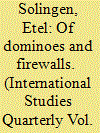

|
|
|
|
|
| Publication |
2012.
|
| Summary/Abstract |
The Great Recession, Euro contagion, Middle East upheavals, nuclear proliferation, and expansion of rights, among others, highlight the centrality of diffusion to international studies. This Presidential Address outlines building blocks for a shared conceptualization of diffusion that is attentive to the initial stimulus; the medium through which information about the stimuli may/may not travel to other destinations; the political agents un/affected by the stimulus' positive or negative externalities, who aid or block the stimulus' journey to other destinations; and outcomes that enable discrimination among grades of diffusion and resulting equilibria. Various issue areas illustrate how initial stimuli may/may not change preferences, transform identities, trigger emotions, alter strategic choices, and affect outcomes. I advance three related considerations. First, to avoid selection bias, understanding what does not diffuse (the "Vegas counterfactual") should be as central as what does. Concepts such as firewalls and sedimentation are essential for gauging a medium's relative immunity/vulnerability to diffusion. Second, weaving domestic, regional, and global considerations into a single analytical framework reduces omitted variable bias and enables systematic cross-regional comparisons. Third, these building blocks imbue the study of diffusion with political dynamics-entailing strategic interaction, contingency, incomplete information, and unintended effects-that defy determinism, automaticity, or teleology. Similar causal mechanisms may yield different outcomes under different domestic, regional, and global conditions. And different mechanisms may yield similar outcomes under comparable circumstances. I highlight the challenges inherent in assessing the outcomes of diffusion given competing empirical findings, epistemologies, and normative readings of what does/does not and should/should not diffuse, and outline an agenda for future research.
|
|
|
|
|
|
|
|
|
|
|
|
|
|
|
|
| 9 |
ID:
155846


|
|
|
|
|
| Summary/Abstract |
To overcome the Great Recession that started in 2008, the European Union (EU) has opted for a strategy that combines austerity-driven fiscal and experimental ‘growth-enhancing’ research, development, and innovation (RDI) policies supported by different coordination mechanisms. We analyse the experiences of four Central and Eastern European economies—the Czech Republic, Estonia, Poland, Slovenia—in implementing this strategy. Given the weak policy capacities both in the EU institutions and CEE economies to draft and coordinate such novel RDI policies, we find that the implementation of this strategy is more challenging under the current EU fiscal and economic policy coordination system than assumed by the EU.
|
|
|
|
|
|
|
|
|
|
|
|
|
|
|
|
| 10 |
ID:
130454
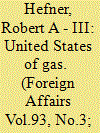

|
|
|
|
|
| Publication |
2014.
|
| Summary/Abstract |
Less than a decade ago, the future of American energy looked bleak. Domestic production of both oil and gas was dwindling, and big U.S. energy companies, believing their fortunes lay offshore, had long since turned away from the mainland. But then something remarkable occurred: a surge of innovation allowed companies to extract vast quantities of natural gas trapped in once-inaccessible deposits of shale. The resulting abundance drove down U.S. gas prices to about one-third of the global average.
|
|
|
|
|
|
|
|
|
|
|
|
|
|
|
|
| 11 |
ID:
137431


|
|
|
|
|
| Summary/Abstract |
The Spanish executive centralized political power to manage the politics of austerity better in the aftermath of the Great Recession. This article analyzes the reinforcement of the power of the central government and argues that three explanatory variables—economic crisis, ideology, and party politics—account for recentralization, which is defined as fiscal consolidation, concentration of competences, bureaucratic rationalization, and ideological convergence. The debate about the motives and nature of recentralization (de jure vs. de facto) further polarized the center-periphery cleavage. Regional prosovereignty parties interpreted the reversal of decentralization as another sign that accommodation within Spain was not possible and that contestation was the way forward.
|
|
|
|
|
|
|
|
|
|
|
|
|
|
|
|
|
|
|
|
|